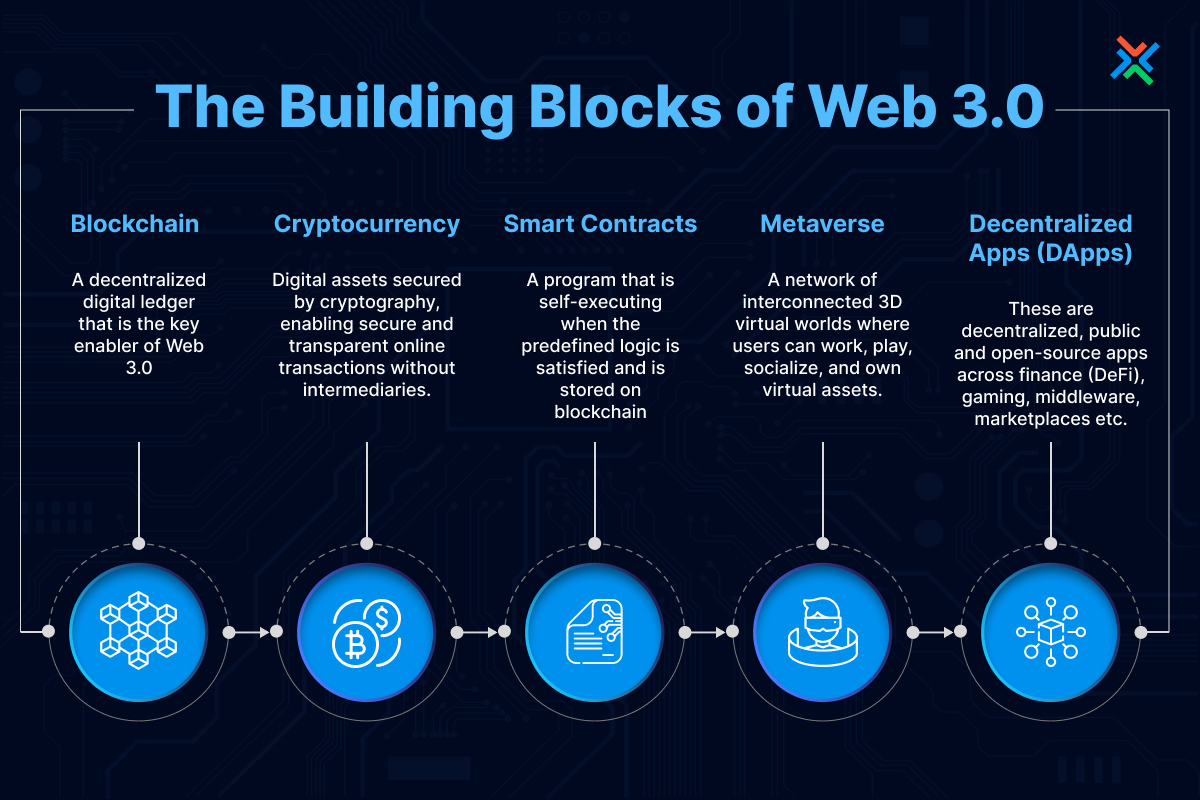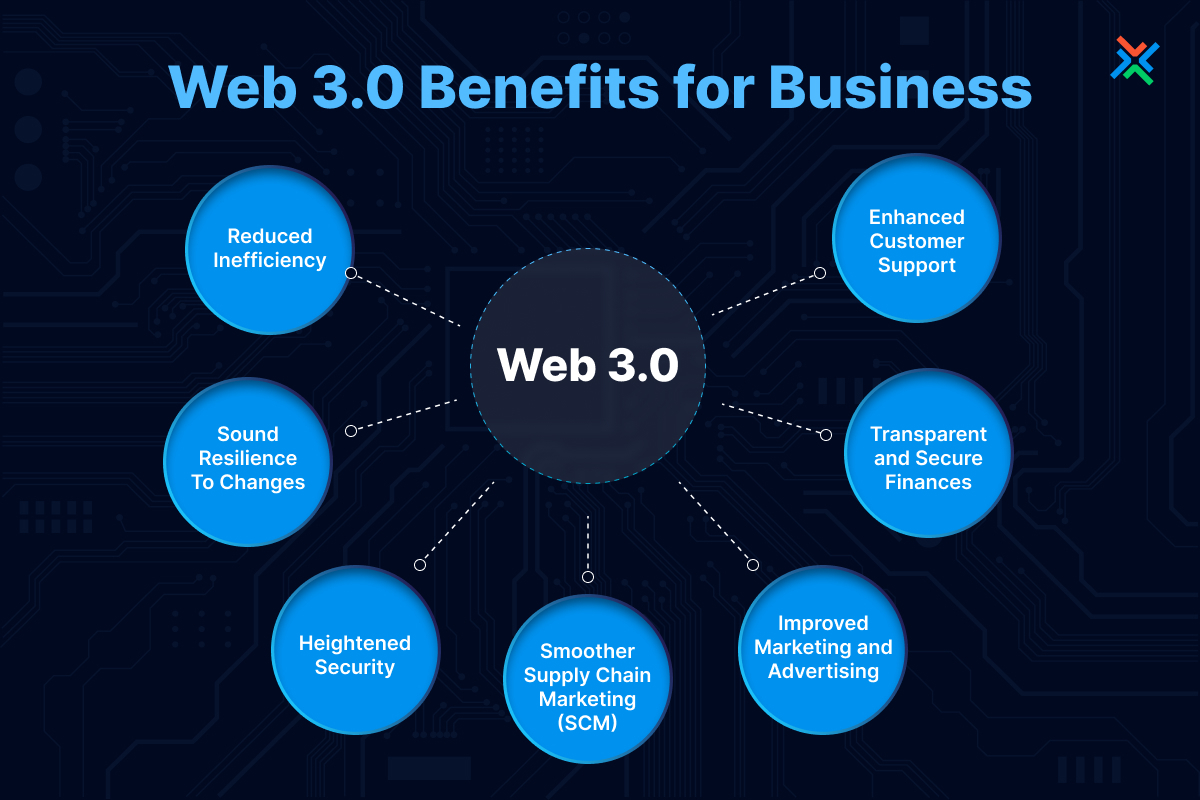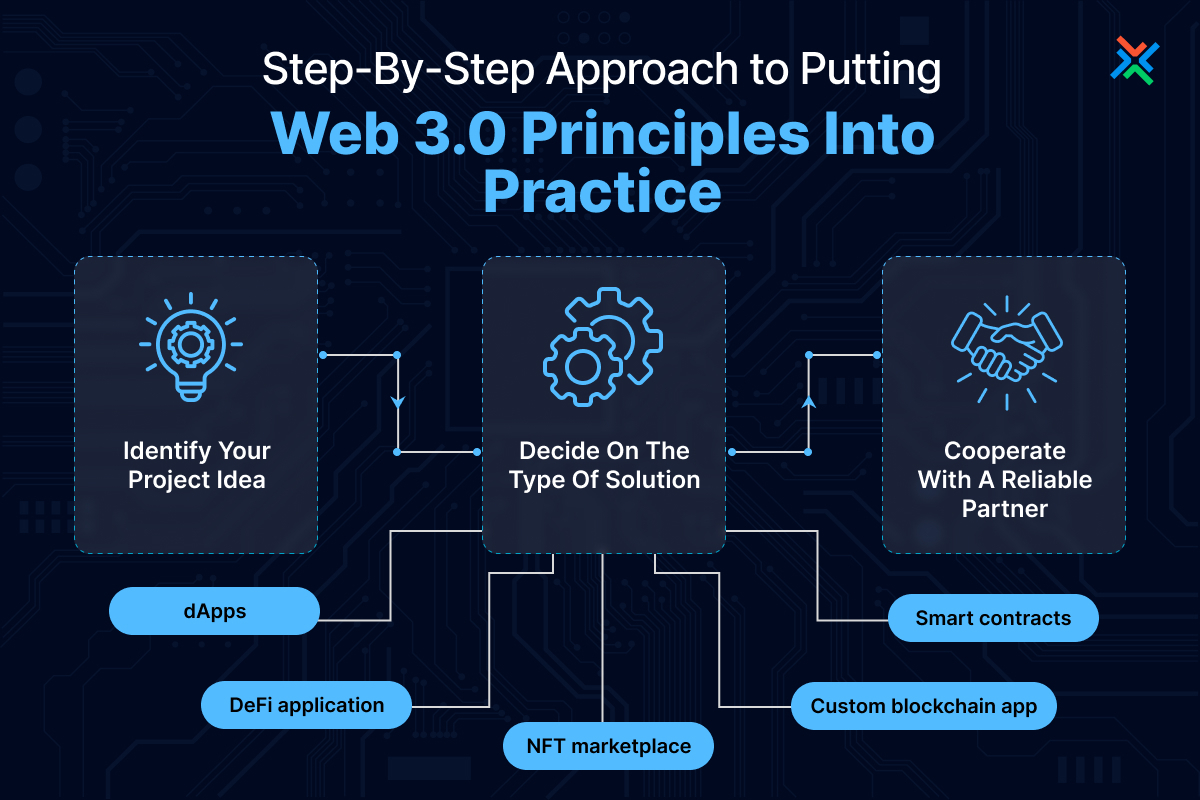The Business Blueprint for Web 3.0: Embracing Blockchain and the Metaverse
June 07, 2024

Vivek Adatia
.jpg?w=1920&q=75)
With the introduction of Web 3.0, we’re moving beyond the social and interactive era of Web 2.0 and toward a decentralized future. Web 3.0 represents a new iteration of the web where users are in control, data is secure and transparent, and power is distributed.
Underpinning Web 3.0 is a set of powerful technologies:
- Blockchain: A distributed ledger technology that acts as a secure and transparent record-keeping system, revolutionizing trust and data management.
- Cryptocurrency: Digital assets that operate on a Blockchain network, facilitating secure and efficient financial transactions without intermediaries.
- Smart Contracts: Self-executing agreements stored on a Blockchain, automating tasks and optimizing processes with increased trust and reduced costs.
- The Metaverse: A persistent 3D virtual world with its economy and social interactions, blurring the lines between the physical and digital space.
The impact of Web 3.0 is expected to be far-reaching, transforming various industries. From finance and healthcare to retail and entertainment, businesses will need to adapt and harness these new technologies to stay competitive in the decentralized future.
Understanding the Building Blocks of Web 3.0
Let’s explore the core technologies powering Web 3.0 in detail.

Blockchain
Blockchain is at the core of Web 3.0. Unlike traditional databases controlled by a single entity, Blockchain distributes information across a network of computers. Each computer holds a complete copy of the ledger, facilitating security and transparency. Every transaction is recorded chronologically and securely, creating an immutable record that cannot be tampered with.
This inherent security makes Blockchain application development ideal for various business applications. For instance, it can revolutionize supply chain management by providing real-time tracking and transparency of goods throughout the entire journey. In the healthcare sector, Blockchain can be used for secure document storage of medical records, ensuring patient data privacy and accessibility.
Cryptocurrency
Cryptocurrency is a digital asset native to Blockchain networks. Unlike traditional fiat currencies controlled by governments, cryptocurrencies operate independently. They are secured through cryptography, making them resistant to counterfeiting and fraud.
Cryptocurrencies offer exciting possibilities for businesses. One key advantage of crypto wallet app development is the potential for faster and cheaper cross-border transactions. Traditional international payments can be slow and involve high fees. Cryptocurrencies can optimize this process, facilitating secure and near-instantaneous transactions.
Smart Contracts
Smart contracts are essentially self-executing programs stored on a Blockchain. They act as digital agreements that automatically trigger actions when predefined conditions are met. This eliminates the need for intermediaries, reduces manual errors, and increases efficiency.
Businesses can utilize smart contracts for various purposes. They can be used to automate payments upon successful delivery of goods or services. In real estate, smart contracts can facilitate secure escrow services, making sure funds are released only upon completion of property transfer.
The Metaverse
Web 3.0 isn't just about reshaping transactions; it's about creating entirely new experiences. It introduces the concept of the Metaverse – a network of interconnected 3D virtual worlds where users can interact, socialize, and conduct business in innovative ways.
Here's how businesses can leverage the Metaverse.
- Virtual Stores and Showrooms: The Metaverse offers businesses the opportunity to create immersive virtual storefronts. Customers can browse products in 3D, interact with virtual salespeople, and even try on clothes or furniture virtually. This can enhance the customer experience and increase engagement.
- Interactive Brand Experiences: Businesses can host product launches, training sessions, or even virtual conferences within the Metaverse. These immersive experiences can foster stronger brand connections and engagement with customers and employees alike.
- Revolutionizing Remote Collaboration: The Metaverse can transform how teams work remotely. Imagine holding meetings in virtual conference rooms where avatars can interact in real-time using spatial audio and video. This can enhance communication and collaboration, creating a more engaging remote work environment.
Ownership of virtual assets within the Metaverse is facilitated by NFTs (Non-Fungible Tokens). NFTs are unique digital certificates stored on a Blockchain, proving ownership of virtual items like clothing for avatars, artwork, or even virtual land. This allows users to buy, sell, and trade these assets within the Metaverse, creating a new digital economy.
The governance of the Metaverse is another interesting aspect. Decentralized Autonomous Organizations (DAOs) are emerging as potential governing bodies. DAOs are essentially online communities with shared goals, governed by collectively agreed-upon rules encoded in smart contracts. This concept could play a role in shaping the future of the Metaverse, leading to the creation of a more democratic and user-driven virtual world.
Business Opportunities in Web 3.0
Web 3.0 is a catalyst for creating entirely new business models and disrupting traditional industries. Here are some key areas where Web 3.0 technologies can open up exciting opportunities.

Decentralized Finance
DeFi refers to a suite of financial services built on blockchain technology. It eliminates the need for intermediaries like banks, allowing users to lend, borrow, invest, and trade directly with each other. This can offer faster transaction speeds, lower fees, and greater accessibility to financial services for a broader audience. Businesses can explore providing DeFi services or integrating them into their existing financial offerings.
Supply Chain Revolution
The transparency and traceability afforded by blockchain can significantly improve supply chain management. Businesses can track goods throughout their journey, from origin to final destination, ensuring authenticity and eliminating counterfeit products. This can enhance customer trust and improve overall supply chain efficiency.
Empowering Data Ownership
Web 3.0 empowers users to own and control their data. Businesses will need to adapt their approach to data collection and usage. Transparency and user consent will be crucial. However, this shift can also create opportunities for building trust and cultivating stronger customer relationships.
The Metaverse Marketplace
The Metaverse presents a new frontier for marketing and customer engagement. Businesses can create immersive virtual experiences, host interactive events, and develop innovative ways to showcase their products or services. The potential for targeted advertising and building brand communities within the Metaverse is huge.
Challenges and Considerations
While Web 3.0 offers exciting opportunities, there are challenges businesses need to consider.
- Regulatory Uncertainty: The regulatory framework surrounding cryptocurrencies and blockchain technology is still developing. Businesses need to stay updated on regulations and ensure compliance.
- Scalability and Security: Blockchain technology is still under development, and scalability and security concerns remain. Businesses need to carefully evaluate the risks involved before adopting these technologies.
- Technical Expertise: Developing Web 3.0 applications requires specialized technical skills and talent. Businesses may need to invest in training existing staff or hire new talent with expertise in blockchain, smart contracts, and Metaverse development.

Adopting the Decentralized Future
Web 3.0 offers businesses a gateway to a more decentralized, secure, and user-centric future. The decentralized nature of Web 3.0 empowers users and opens doors for innovation across industries.
Forward-thinking businesses that harness Web 3.0 technologies will be well-positioned to thrive in the decentralized future. Whether it's exploring DeFi solutions, reinforcing supply chain transparency, or building engaging experiences within the Metaverse, myriad opportunities are waiting to be explored.
WDCS Technology, as a leading web3 app development company, is here to guide you on this venture. We possess expertise in blockchain development, smart contracts, and Metaverse applications to help your business tap into the incredible potential of Web 3.0 technology. Contact us today to learn more about how our Web 3.0 development services can help your business stay ahead of the curve.
Future-proof your business with Web 3.0 solutions from WDCS Technology
The future of business is decentralized. WDCS Technology provides a comprehensive suite of Web 3.0 solutions to optimize your operations and open up new revenue streams.